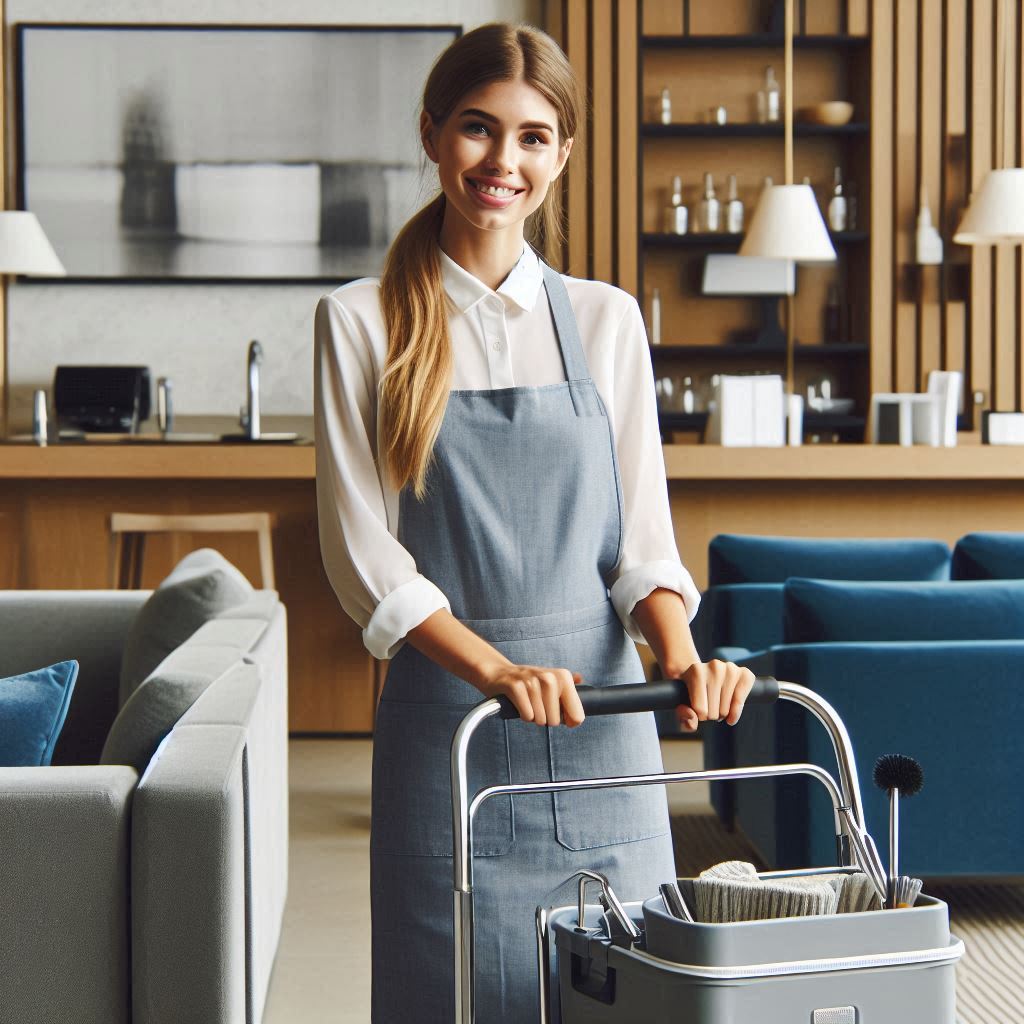Introduction
Housekeepers play a vital role in maintaining cleanliness, organization, and overall comfort in a wide variety of settings, including hotels, offices, hospitals, and private residences.
Their work is essential in ensuring that spaces remain hygienic, safe, and welcoming for occupants and visitors.
Whether it’s cleaning rooms, managing supplies, or attending to special requests, housekeepers contribute to the overall satisfaction of guests and help maintain the reputation of businesses.
The importance of their work cannot be overstated, as a well-kept environment promotes health and enhances the overall experience for those who use it.
Over the years, the role of housekeepers has evolved significantly.
What was once primarily a task-based job focused on basic cleaning has transformed into a multifaceted role requiring a range of skills.
Housekeepers are now expected to manage inventories, handle customer service interactions, and use advanced cleaning technologies to ensure safety and efficiency.
The rise of health and safety standards, particularly in industries like hospitality and healthcare, has further elevated the importance of their role.
Additionally, many housekeepers now work closely with management teams, playing a key part in maintaining operational efficiency and ensuring compliance with regulations.
This evolution has turned housekeeping into a respected and skilled profession, essential to the success of businesses and organizations.
Overview of Housekeeper Job Description
The Primary Duties and Responsibilities of a Housekeeper
A housekeeper‘s main responsibility is to maintain cleanliness and order in assigned areas.
This includes cleaning, dusting, and organizing rooms and spaces.
Housekeepers vacuum carpets, mop floors, and clean windows to ensure that all areas are spotless.
They change bed linens, clean bathrooms, and disinfect surfaces to maintain hygiene.
In addition to cleaning, housekeepers also replenish toiletries, towels, and other supplies.
Some housekeepers may also be responsible for laundry duties, ironing clothes, and ensuring closets are tidy.
Housekeepers work independently or as part of a team.
They follow a cleaning schedule to ensure that all tasks are completed efficiently.
Housekeepers also monitor the cleanliness of public spaces such as lobbies, hallways, and restrooms.
They report any maintenance issues or damages they encounter during their work.
By keeping spaces clean and orderly, housekeepers contribute to the comfort and satisfaction of guests or residents.
The Different Settings Where Housekeepers Work, Such as Hotels, Hospitals, and Private Residences
Housekeepers work in various settings depending on their employer‘s needs.
Hotels are one of the most common workplaces for housekeepers.
In hotels, they clean guest rooms, public areas, and sometimes event spaces.
Hospitals also rely on housekeepers to maintain sterile and clean environments for patients.
In this setting, housekeepers must follow specific protocols to ensure the safety of patients and staff.
Private residences are another common workplace for housekeepers.
In homes, they manage day-to-day cleaning tasks and often work closely with families or individuals.
Additionally, housekeepers can be found in other settings such as offices, educational institutions, and care facilities.
In each of these environments, the job’s core duties remain the same, although specific tasks may vary.
For example, housekeepers in healthcare settings may focus more on disinfecting surfaces, while in private homes, they may handle personal laundry and deep cleaning.
The Importance of Attention to Detail and Efficiency in This Role
Attention to detail is a critical skill for housekeepers.
They must ensure that no area is overlooked during the cleaning process.
Thoroughness in their work guarantees that spaces are not only clean but also safe and comfortable for use.
Missing a spot or failing to clean properly can lead to complaints or even health issues, especially in hospitals or care facilities.
By paying attention to every detail, housekeepers ensure a high standard of cleanliness and order.
Efficiency is equally important in housekeeping.
Housekeepers often work under tight schedules, especially in hotels or hospitals where rooms must be cleaned quickly for new guests or patients.
Efficient time management allows housekeepers to complete their tasks promptly without sacrificing quality.
By combining attention to detail with efficient practices, housekeepers can deliver exceptional service, keeping spaces clean and well-maintained.
Read: Top Pet Grooming Conferences and Expos in the USA
Cleaning Tasks
Specific cleaning tasks that housekeepers are expected to perform, such as dusting, sweeping, mopping, and vacuuming
Housekeepers are responsible for performing a variety of cleaning tasks to maintain the cleanliness and orderliness of spaces.
These tasks include dusting surfaces, sweeping and mopping floors, vacuuming carpets, and wiping down windows and mirrors.
Dusting helps eliminate dirt and allergens from furniture, shelves, and other surfaces.
Sweeping and mopping remove dirt and debris from floors, ensuring a polished and sanitized look.
Vacuuming is essential for carpets and rugs to remove dust, pet hair, and other particles.
Housekeepers also clean bathrooms, disinfect surfaces, and sanitize high-touch areas such as doorknobs and light switches.
Cleaning kitchens may involve wiping countertops, cleaning appliances, and emptying trash cans.
In addition to these routine tasks, housekeepers may handle laundry duties, such as washing, folding, and ironing clothes or linens.
Regularly cleaning and replenishing supplies, such as toiletries, towels, and tissues, are also part of the job.
The Importance of Following Proper Cleaning Procedures
Following proper cleaning procedures is crucial to maintaining a high level of cleanliness.
Housekeepers must use the right cleaning techniques to ensure that surfaces are effectively cleaned and disinfected.
Proper procedures prevent cross-contamination, especially in environments such as hospitals or kitchens.
For example, using different cleaning cloths for bathrooms and kitchens ensures that germs do not spread from one area to another.
In high-traffic areas like hotels or hospitals, thorough cleaning is essential for guest satisfaction and health safety.
By adhering to established cleaning protocols, housekeepers help prevent the spread of germs and bacteria.
This is especially important when disinfecting surfaces, as improper cleaning could leave harmful pathogens behind.
Using appropriate cleaning products and tools ensures that the environment is not only clean but also safe for those who occupy it.
Use of Various Cleaning Tools and Products
Housekeepers often rely on a variety of cleaning tools and products to complete their tasks efficiently.
Common tools include brooms, mops, vacuums, dusters, and cleaning cloths.
They also use specialized equipment, such as steam cleaners, for deep cleaning carpets and upholstery.
Microfiber cloths are preferred for dusting and wiping surfaces, as they trap dirt effectively without spreading it around.
In addition to tools, housekeepers use various cleaning products, such as disinfectants, glass cleaners, and degreasers.
The choice of product depends on the surface being cleaned and the type of dirt or stains present.
Housekeepers must know how to use these products safely and correctly to avoid damaging surfaces or causing harm to themselves.
By using the right combination of tools and cleaning solutions, housekeepers ensure that each task is completed effectively, leaving spaces spotless and sanitized.
Read: Educational Requirements for Childcare Workers Explained
Organizational Responsibilities
How Housekeepers Are Responsible for Maintaining Organization Within Their Assigned Areas
Housekeepers play a crucial role in maintaining organization within their assigned areas.
Their efforts ensure a clean and welcoming environment for residents and guests.
A well-organized space not only enhances the overall appearance but also contributes to a sense of calm and comfort.
Housekeepers focus on keeping their areas tidy, which is essential for promoting a positive atmosphere.
Tasks Such as Making Beds, Organizing Belongings, and Managing Inventory of Cleaning Supplies
One of the primary responsibilities of housekeepers includes making beds daily.
This task sets a positive tone for the room and significantly enhances its appeal.
In addition to bed-making, housekeepers also organize belongings, ensuring that items such as clothes and toiletries have designated places.
This organization helps residents locate their belongings quickly and maintains a tidy environment.
Managing inventory of cleaning supplies is another vital task for housekeepers.
They must keep track of cleaning products, tools, and equipment needed for their duties.
Regularly checking inventory levels prevents shortages and ensures they have what they need to maintain cleanliness.
Housekeepers should report low stock levels to their supervisors in a timely manner, promoting efficient operations.
The Importance of Prioritizing Tasks and Working Efficiently to Meet Deadlines
Prioritizing tasks is essential for housekeepers to work efficiently.
They often face a long list of responsibilities to complete within a limited timeframe.
For example, they may need to clean multiple rooms, restock supplies, and attend to special requests.
By prioritizing their tasks, housekeepers can focus on the most critical areas first, ensuring that essential duties are accomplished.
Creating a daily checklist is a valuable strategy for housekeepers.
This tool helps them stay organized and ensures they don‘t overlook any responsibilities.
They can check off tasks as they complete them, providing a sense of accomplishment and clarity.
A checklist also helps housekeepers manage their time effectively, enabling them to meet deadlines consistently.
Working efficiently allows housekeepers to maintain high standards of cleanliness.
It reduces the likelihood of feeling overwhelmed by their workload.
Familiarizing themselves with the layout of their assigned areas enhances their ability to organize efficiently.
Knowing where everything is located saves time and streamlines their workflow.
In high-demand environments, such as hotels or hospitals, housekeepers often face strict deadlines.
Meeting these deadlines is crucial for overall guest satisfaction.
A clean and organized room can significantly impact a guest’s experience and perception of the establishment.
Housekeepers contribute to this success by maintaining organization in their work areas.
Ultimately, the organizational responsibilities of housekeepers are vital.
Their attention to detail and commitment to cleanliness create a pleasant environment.
Through effective organization, they ensure that each space remains inviting and functional.
By prioritizing tasks and managing their time, housekeepers uphold the high standards expected in their profession.
Their efforts reflect positively on the organization they represent, making them an essential part of the team.
Read: Top Certifications for Advancing in Childcare Careers
Maintenance Duties
How Housekeepers May Be Required to Perform Minor Maintenance Tasks
Housekeepers often play a vital role in maintaining the overall functionality of their assigned areas.
In addition to cleaning, they may be required to perform minor maintenance tasks.
This includes changing light bulbs, tightening loose fixtures, or replacing batteries in smoke detectors.
By addressing these small issues promptly, housekeepers help create a safe and comfortable environment for residents and guests.
When housekeepers identify maintenance problems, they are responsible for reporting them to the appropriate personnel.
This proactive approach ensures that issues like leaky faucets or malfunctioning appliances are addressed quickly.
By taking the initiative to report these concerns, housekeepers contribute to the overall upkeep of the facility.
The Importance of Communicating Effectively with Maintenance Staff
Effective communication with maintenance staff is essential for housekeepers.
When housekeepers report issues, they must provide clear and detailed information.
This helps maintenance staff understand the problem and respond appropriately.
Clear communication can prevent misunderstandings and ensure that repairs are completed efficiently.
Housekeepers should maintain open lines of communication with maintenance personnel.
Regular meetings or check-ins can facilitate this process.
Such interactions allow housekeepers to express any recurring issues or concerns, fostering a collaborative environment.
This teamwork is crucial for ensuring a safe and functional space for all.
The Significance of Following Safety Protocols While Completing Maintenance Tasks
Safety is paramount when housekeepers perform minor maintenance tasks.
They must follow established safety protocols to prevent accidents and injuries.
This includes using the correct tools and equipment for the job.
For instance, when changing a light bulb, housekeepers should ensure they are using a stable ladder and wearing appropriate safety gear.
Moreover, housekeepers should be aware of their limitations.
If a task exceeds their skill set, they must report it to maintenance staff rather than attempting it themselves.
This practice helps maintain safety standards and prevents potential hazards.
By adhering to safety protocols, housekeepers protect themselves and others in the environment.
Maintenance duties are an essential aspect of a housekeeper‘s role.
Their ability to perform minor maintenance tasks helps sustain a safe and functional environment.
Effective communication with maintenance staff enhances the overall efficiency of operations.
Following safety protocols is crucial for preventing accidents and ensuring the well-being of everyone in the facility.
Through these responsibilities, housekeepers contribute significantly to the overall success of the organization.
Their vigilance and proactive approach are invaluable in maintaining high standards of cleanliness and safety.
Read: How to Balance Work and Personal Life in Childcare

Guest Interaction
How Housekeepers May Interact with Guests in Hospitality Settings
Housekeepers often have direct interactions with guests in hospitality settings.
While their primary responsibility is to maintain cleanliness, they also play a crucial role in guest experiences.
During their cleaning routines, housekeepers may encounter guests in hallways or rooms.
This presents an opportunity for them to engage positively with guests.
Housekeepers often greet guests warmly, creating a friendly atmosphere.
A simple ‘Good morning‘ or ‘How is your stay so far?‘ can make a significant impact.
Such interactions help establish rapport and can enhance the overall guest experience.
Additionally, housekeepers may provide helpful information about the hotel‘s amenities or services during these encounters.
The Importance of Maintaining a Professional and Friendly Demeanor
Maintaining a professional and friendly demeanor is essential for housekeepers.
Their interactions with guests contribute to the establishment‘s image and reputation.
A positive attitude not only reflects well on the housekeeper but also on the entire hospitality team.
Housekeepers must remain courteous and respectful, regardless of the situation.
They should handle guest interactions with care, ensuring that their demeanor aligns with the organization‘s standards.
A professional approach fosters trust and makes guests feel valued, which is crucial for repeat business and positive reviews.
How Housekeepers May Need to Address Guest Requests
Housekeepers may frequently encounter guest requests during their shifts.
Guests may ask for additional towels, toiletries, or even assistance with room-related issues.
Housekeepers must be attentive and responsive to these requests, as they directly affect guest satisfaction.
When addressing guest requests, housekeepers should prioritize efficiency and accuracy.
They should ensure that they fulfill requests promptly and follow up to ensure satisfaction.
For instance, if a guest requests extra pillows, the housekeeper should deliver them quickly and inquire if they need anything else.
In addition to fulfilling requests, housekeepers must also listen actively to guests.
By doing so, they can address any concerns or complaints effectively.
If a guest expresses dissatisfaction with their room, the housekeeper should listen carefully and report the issue to the appropriate staff member for resolution.
Enhances the overall experience and fosters a welcoming environment.
By maintaining a professional and friendly demeanor, housekeepers help establish the establishment‘s reputation for excellent customer service.
Addressing guest requests efficiently contributes to guest satisfaction and reflects the organization‘s commitment to quality.
Through these interactions, housekeepers play a significant role in creating memorable experiences for guests, reinforcing the importance of their position within the hospitality industry.
Their efforts not only impact individual stays but also influence the establishment’s long-term success.
Transform Your Career Today
Unlock a personalized career strategy that drives real results. Get tailored advice and a roadmap designed just for you.
Start NowDiscover More: Housekeeper Job Benefits: What to Expect
Time Management Skills
The Importance of Time Management Skills in the Role of a Housekeeper
Time management skills are crucial for housekeepers to perform their duties effectively.
In a hospitality setting, housekeepers often juggle multiple tasks throughout their shifts.
The ability to manage time efficiently directly impacts the quality of service they provide.
When housekeepers prioritize and complete tasks promptly, they contribute to a clean and welcoming environment for guests.
Effective time management allows housekeepers to maximize productivity.
It ensures that they can meet their responsibilities without feeling overwhelmed.
A well-organized approach to time management also helps maintain high standards of cleanliness and organization, which are essential for guest satisfaction.
Strategies for Prioritizing Tasks and Completing Them Within Designated Time Frames
Housekeepers can employ various strategies to prioritize tasks and complete them within designated time frames.
One effective method is creating a daily checklist of responsibilities.
By outlining tasks in order of importance, housekeepers can focus on high-priority areas first.
This practice ensures that essential duties, such as cleaning guest rooms, are addressed promptly.
Additionally, housekeepers should allocate specific time blocks for each task.
For example, they may assign 30 minutes for cleaning a guest room and 15 minutes for restocking supplies.
Setting time limits helps them stay focused and reduces the likelihood of procrastination.
Another valuable strategy is grouping similar tasks together.
For instance, a housekeeper may choose to complete all laundry-related tasks in one block of time.
This approach minimizes disruptions and enhances efficiency, allowing them to complete multiple tasks swiftly.
The Importance of Adapting to Changing Schedules and Unexpected Challenges
In a fast-paced work environment, housekeepers must be prepared to adapt to changing schedules and unexpected challenges.
Last-minute guest requests or maintenance issues can disrupt their planned routines.
Being flexible and open to change is essential for maintaining service quality.
Housekeepers should develop a mindset that embraces adaptability.
When faced with unexpected challenges, they must remain calm and reassess their priorities.
For example, if a guest requests additional services, a housekeeper may need to adjust their schedule to accommodate the request without sacrificing the quality of their work.
Additionally, maintaining effective communication with team members and supervisors is crucial.
By keeping everyone informed about changes in schedules or tasks, housekeepers can collaborate more effectively.
This teamwork ensures that all responsibilities are met, even when challenges arise.
Time management skills are vital for housekeepers to perform their roles efficiently.
By prioritizing tasks, creating checklists, and grouping similar responsibilities, they can maximize productivity.
Adapting to changing schedules and unexpected challenges is equally important, enabling housekeepers to maintain high standards of service.
Through effective time management, housekeepers contribute significantly to the overall success of their team and the satisfaction of guests.
Their ability to balance multiple responsibilities while staying organized and flexible reflects their professionalism and commitment to excellence in the hospitality industry.
Communication with Supervisors
The Importance of Effective Communication Between Housekeepers and Their Supervisors
Effective communication between housekeepers and their supervisors is crucial for maintaining a well-functioning team.
Clear communication fosters a collaborative work environment where expectations are understood.
Housekeepers rely on supervisors for guidance, support, and feedback on their performance.
This interaction helps ensure that everyone is aligned with the organization’s goals and standards.
When housekeepers communicate openly with their supervisors, they can address any challenges they encounter.
This proactive approach allows for quicker resolutions and enhances overall team efficiency.
Additionally, effective communication helps build trust and rapport, which are essential for a positive workplace culture.
How Housekeepers May Need to Report Any Issues or Concerns to Their Supervisors in a Timely Manner
Housekeepers must report any issues or concerns to their supervisors promptly.
Whether it’s a maintenance issue, a supply shortage, or a guest complaint, timely reporting is essential for effective resolution.
For example, if a housekeeper notices a plumbing problem in a guest room, they should inform their supervisor immediately.
This ensures that maintenance can address the issue without delay, preventing further complications.
In addition to reporting problems, housekeepers should also communicate any safety concerns.
Maintaining a safe environment is a top priority in hospitality settings.
By promptly reporting hazards or unsafe conditions, housekeepers contribute to the overall safety of both guests and staff.
The Significance of Following Instructions and Seeking Clarification When Needed
Following instructions from supervisors is vital for housekeepers to meet job performance expectations.
Clear directives help housekeepers understand their responsibilities and the standards they must uphold.
When housekeepers follow these instructions closely, they contribute to a consistent level of service throughout the establishment.
However, if housekeepers encounter unclear instructions or uncertainties, seeking clarification is essential.
Asking questions demonstrates a commitment to understanding expectations and performing the job correctly.
This proactive approach minimizes errors and ensures that housekeepers can fulfill their responsibilities effectively.
Supervisors appreciate when housekeepers seek clarification, as it shows initiative and a desire for improvement.
By fostering an environment where questions are encouraged, supervisors can enhance the overall performance of their team.
Effective communication between housekeepers and their supervisors is essential for a successful work environment.
Timely reporting of issues and concerns enables quick resolutions and promotes safety.
Following instructions and seeking clarification when needed ensures that housekeepers meet performance expectations.
Through open dialogue and clear communication, housekeepers can contribute significantly to the overall success of their team.
Their ability to engage with supervisors fosters a positive workplace culture and enhances guest satisfaction, reflecting the organization‘s commitment to excellence.
Conclusion
The role of a housekeeper is vital in maintaining clean, organized, and comfortable living and working environments.
Throughout this blog, we explored various duties and responsibilities that housekeepers perform, such as cleaning, organizing, and maintaining household supplies.
Housekeepers are essential in ensuring that spaces remain welcoming and hygienic for residents and guests.
One of the key points emphasized is the importance of attention to detail.
A meticulous housekeeper pays close attention to every corner, ensuring that no dirt or clutter goes unnoticed.
This commitment to thorough cleaning not only enhances the aesthetic appeal of a space but also promotes health and safety by reducing allergens and germs.
Time management is another critical skill for housekeepers.
Balancing multiple tasks and priorities efficiently is essential for meeting deadlines and maintaining a consistent cleaning schedule.
A well-organized housekeeper can effectively plan their day to accomplish all necessary tasks without feeling rushed, ensuring high-quality results every time.
Strong communication skills also play a significant role in the effectiveness of a housekeeper.
Clear communication with clients, supervisors, and other team members ensures that everyone is on the same page regarding expectations and preferences.
This skill helps to build trust and rapport, making it easier to address any concerns or special requests that may arise.
[E-Books for Sale]
The Big Book of 500 High-Paying Jobs in America: Unlock Your Earning Potential
$19.99 • 500 High-Paying Jobs • 330 pages
Explore 500 high-paying jobs in America and learn how to boost your career, earn more, and achieve success!
See All 500 High-Paying Jobs of this E-Book
1001 Professions Without a Degree: High-Paying American Jobs You Can Start Now
$19.99 • 1001 Professions Without a Degree • 174 pages
Discover 1001 high-paying jobs without a degree! Unlock career tips, skills, and success strategies for just $19.99!




